Looking back on my first days as a solo entrepreneur in 2016, I didn’t have a framework for how to choose the best blog post topics to support my new business.
I had plenty of content ideas. However, they weren’t always the best topics to attract my target audience and build my business. And, it showed in my lack of results.
Because without a strategic path to guide your decisions, you’ll rely on gut instinct, personal interests, market trends, or momentary inspiration to select blog topics. (Like I did at first!) Unfortunately, those methods don’t help you to choose content topics that:
- Appeal to a very specific target audience (to attract qualified leads and buyers)
- Help you rank higher in search engines (to increase lead generation)
- Align with your business goals and offers (to generate more leads and sales)
A blog is only as effective as its content. Write about the wrong things and you’ll have trouble attracting quality leads that turn into sales.
So, as a small business, if you’re wondering, “what should I blog about?” or “how do I choose the best blog post topics?” then you’re in the right place!
Let’s review one process to come up with the best blog topics to increase your leads and sales. (PS you can use this method to find podcast and video topics too!)
Check out these 3 steps to finding blog topics that support business growth.Click To TweetAlways Start with a Content Strategy
A word of caution: do not put the cart before the horse. Sure, you’re excited to start your content marketing for your small business! However, spend a few hours on your content strategy first.
Strategy and planning are always the first steps for content marketing success.
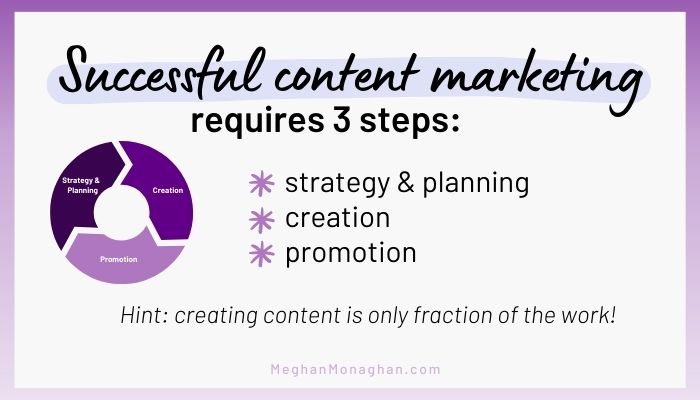
When you create a content strategy, you identify the basics, which are the foundation of a blog that increases lead generation and sales. Without a strategy, you’ll struggle to choose blog topics that support business growth.
So, take out a piece of paper or open a digital notes app and identify:
- Who your blog is for (aka target audience)
- Why you’re blogging (aka business goals and what you aim to accomplish with your content)
- What you’re blogging about (aka the content you’ll focus on to reach your avatar and business goals…part of which we’re expanding on in this article!).
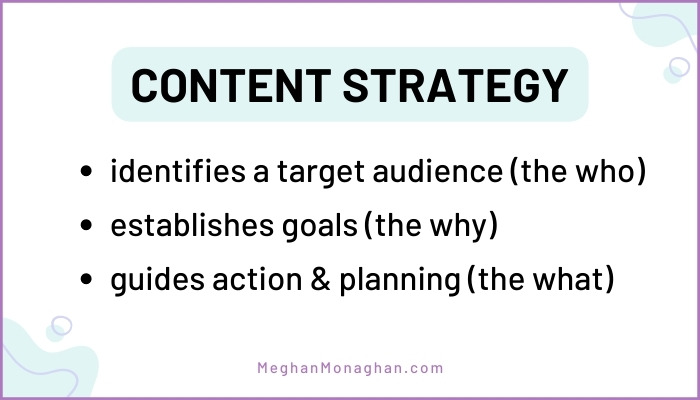
Check out my post on how to create your own simple content strategy.
Step 1: Brainstorm Topic Ideas and Create a List
With your strategy outlined, the first thing you’re going to do is develop some topic ideas. This step is all about brainstorming.🤔
There’s no right or wrong here…so don’t overthink. Put on your creative hat and start documenting any ideas you have.
Open a document or spreadsheet and get ready for some typing!
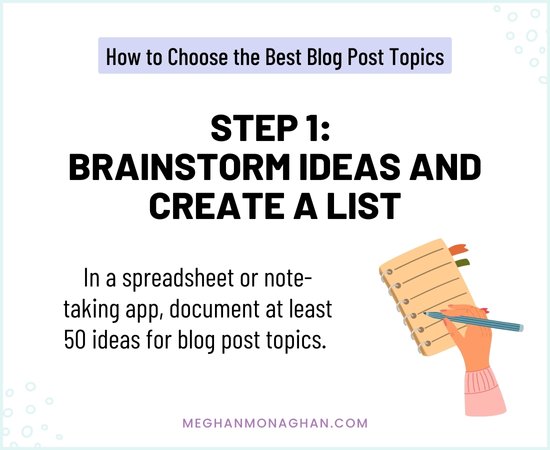
Your goal is to come up with at least 50 ideas for blog post topics. Don’t put too many parameters around your creative process. You’ll sort the winners from the losers in the next step.
No ideas? No problem!
Here are some suggestions to help inspire your list of content topics–and don’t forget to document your ideas as you go along.
Use ChatGPT to Brainstorm
Open ChatGPT or another AI tool and ask for help brainstorming ideas for your blog. Be sure to provide enough details in the prompt to achieve better results. (This is another place where a content strategy will help!)
In your prompts, be sure to include or describe things such as:
- Business details (industry, services/offers, type of business)
- Target audience
- Blog or business goals
- What kind of content you’re aiming for
Here’s an example prompt:

With ChatGPT, the more vague the prompt, the more generic the response. In my experience, the results are better if I spend more time upfront within a chat to train the AI to understand my target audience better.
I’ve found that ChatGPT is a great assistant for brainstorming ideas, but I usually have to modify the AI suggestions. And, that’s okay!
Take Advantage of the Competition
Looking at your competition is a shortcut to getting some insight as to what’s working. Why not benefit from the results of what others have done before you?
So, check out your competitors’ online assets. Review their blog posts, videos, and podcasts to get inspiration.
By the way, when I say, “competitors,” I’m referring to both the:
- businesses in your industry who offer similar products and services to your target audience and
- websites that publish content that competes with yours.
“Content competitors” may not be your actual competition in a products/services sense. However, your content will compete with them in search engines.
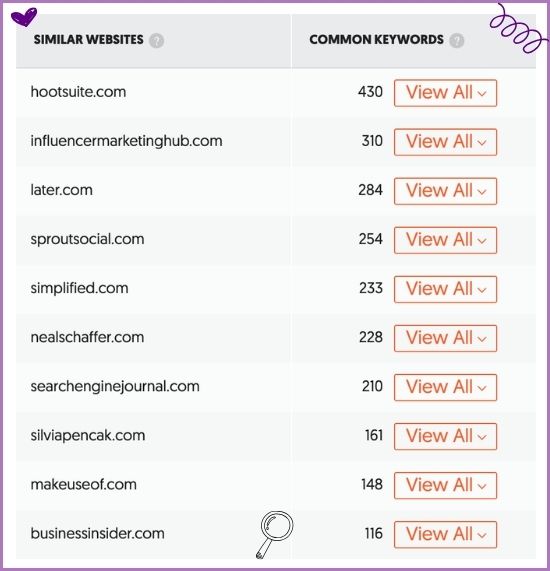
For example, Hootsuite publishes a lot of similar blog content as I do. Our target audiences may overlap, although our business offers are totally different.
To figure out your content competitors, choose a topic or keyword and perform a search in Google. You’ll discover who is already ranking for that content and who you’ll have to outperform in search engine results.
Look at Your Own Business’s Blog Metrics
If you have an existing blog, check out your Google Analytics (GA4) and Google Search Console metrics. Your audience’s preferences and behavior can indicate whether a current blog post topic is popular. You can find those popular posts to come up with related topics.
This step is simply about reviewing your own analytics to influence your future content themes.
There are many data points to consider, but here are a few examples:
- Average engagement time (GA4)
- Views per user (GA4)
- Events and conversions (if you’ve set those up in GA4)
- Search results / Queries and Pages (Console)
- Most popular content (Console / Insights)
I recommend analyzing your content over certain periods of time, such as the last 30 – 90 days, past six months, and past year.
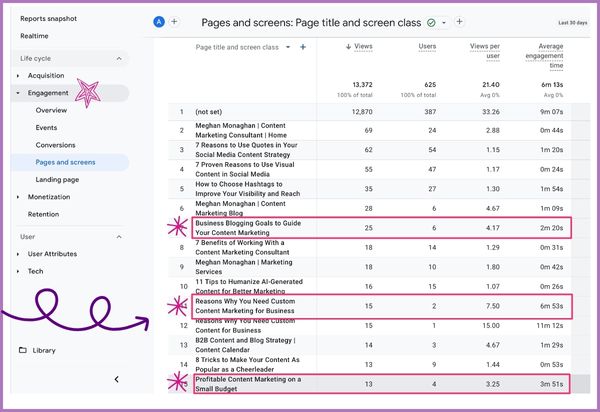
Look at your website’s Google Analytics to find out which pages/posts are popular and consider splintering a topic from them.
Review the search terms and pages that are popular or unpopular to find inspiration. For example, you could splinter off some content from an existing popular post to go more in-depth on one aspect within that post.
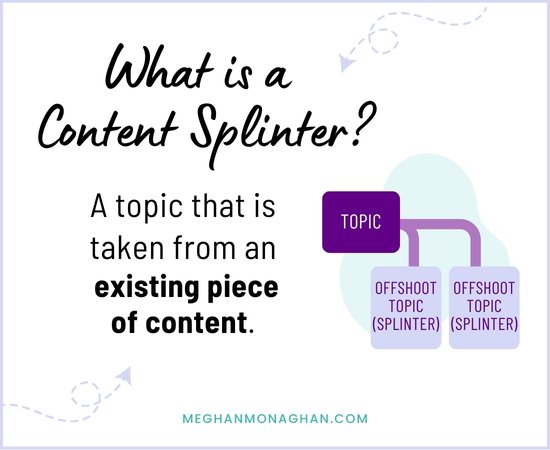
Likewise, find the posts that have the highest engagement time to understand where visitors are spending time on your site. This can indicate topics that are of great interest, which could spark more content topic ideas.
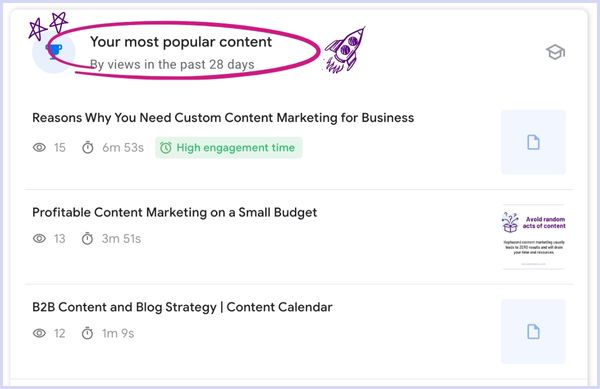
Google Search Console offers insights such as “most popular content” which makes it easier to see what existing content is performing well so that you can get ideas.
Review Your Business Assets
If you’ve been in business for a while, you may have a wealth of data as a reference to help you choose blog topics. Things like:
- Blog or video comments
- Reviews
- Social media feedback
- Frequently asked questions (FAQs)
- Splinter topics (topics that are offshoots from existing content)
- Offers
- Sales pages
- Emails
- Surveys you’ve done
Going through these assets often inspires blog post ideas and things you should address in your content.
By the way, while FAQs are a resource for you to find content ideas, BAQs are even better. Listen to this podcast episode to find out more:
Explore Keywords via SEO and Marketing Tools
In reality, blog post topics are really “keywords.” They are the common, popular phrases and questions that your target audience is typing into search engines.
For example, this blog post’s topic is “how to choose blog post topics.” That’s also the keyword phrase.
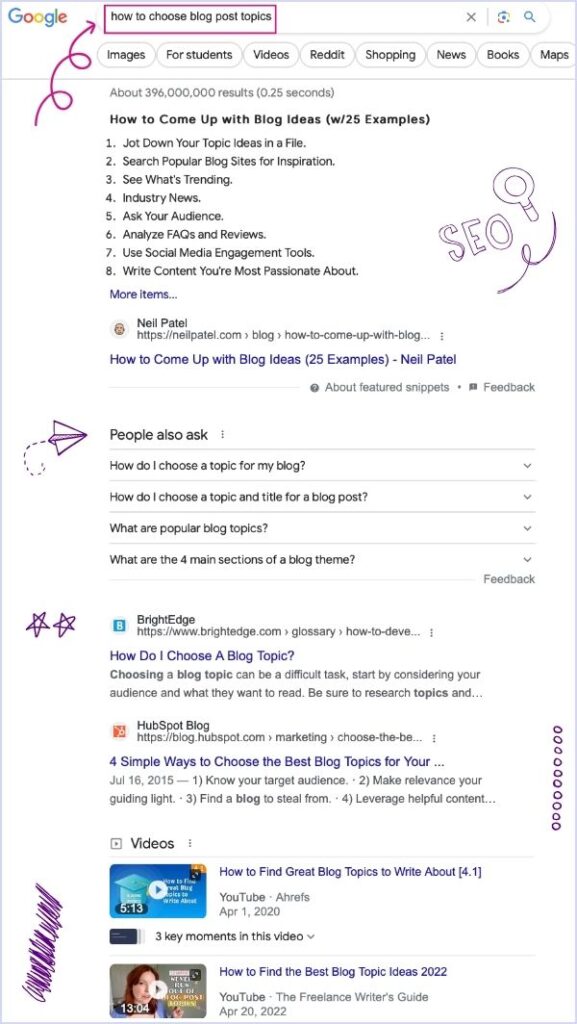
Keywords are a part of search engine optimization (SEO) and help your website appear higher up on search engine results pages (SERPs).
Researching keywords is a great way to generate topic ideas. Here are some tools that can help you discover keywords and content ideas:
- Answer The Public (good for questions asked online)
- Ubersuggest (good for researching what’s ranking and content ideas)
- Keyword Tool
- Moz’s Keyword Explorer
- Wordstream’s Free Keyword Tool
- Semrush (one of the best, but expensive and has a learning curve)
For instance, Moz’s tool displays keyword suggestions as well as other details, which makes it a great resource.
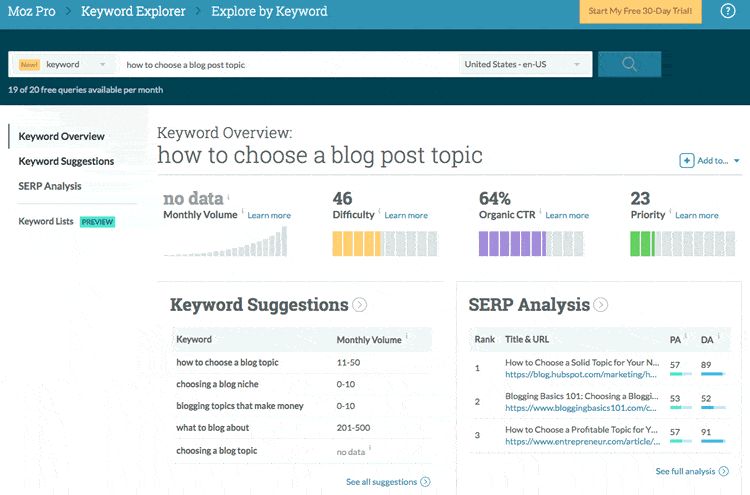
Of course, you can get really low tech and use Google for keyword and topic research!
You’ll get loads of useful data just from a simple search in Google. This is one of the reasons that Google is one of the best free SEO research tools.
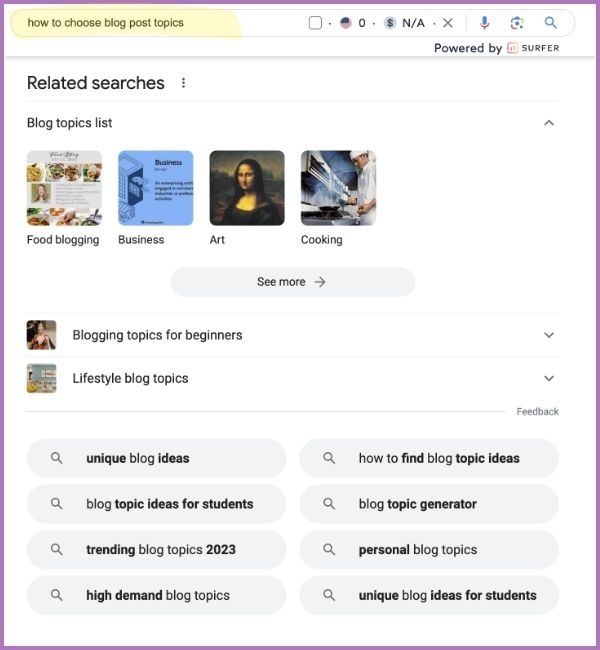
To boost your options, consider installing a free Chrome browser extension from Ubersuggest or Surfer. With each topic/keyword search, these tools offer you additional content ideas along with a few metrics.
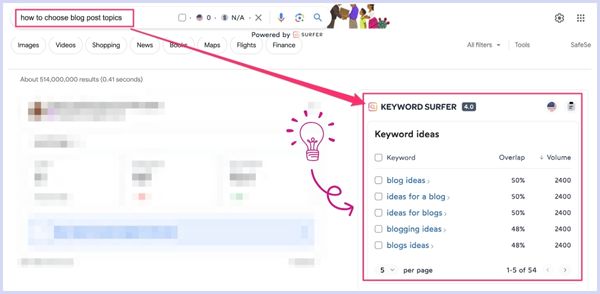
Content and SEO tools are an effective way to come up with ideas and analyze them at the same time. This is a win for productivity, and I’m a fan of this method for brainstorming!
Search Other Websites for Ideas
If you don’t have at least 50 blog post ideas yet, then search data-rich websites for content topics.
There are search engines like Google, Bing, DuckDuckGo, and Yahoo. Then there are other sites that function like search engines to discover information. These websites can be very inspirational for coming up with content ideas.
Here are a few sites to try:
- Amazon (search the book titles and table of contents as well as reviews)
- YouTube
- Course sites (like Udemy, Coursera, etc.)
- Quora
Check out this podcast episode for a few other blog content ideas and suggestions:
Step 2: Assess the Topics for Business Alignment
It’s time to take off the creativity hat and put on your analyst cap to explore the ideas you came up with to assess whether they are the right and relevant topics for your business.
How will you know if a topic is right or relevant? You’ll assess them based on your goals and content strategy, which are business requirements.

Of course, every business has its own blog goals and objectives. Therefore, there’s no definitive rule of thumb that I can give you in an article like this one.
But, in general, I do believe that each topic should meet at least two criteria:
- Be relevant to your specific target audience of potential buyers and
- Align with your expertise, business, and products/services
If you pay attention to what your prospective customer desires and what your business needs to succeed, then you’re on the right path with your blog!
For instance, ChatGPT suggested I create a blog post on “Navigating the World of Paid Advertising for Small Businesses.”
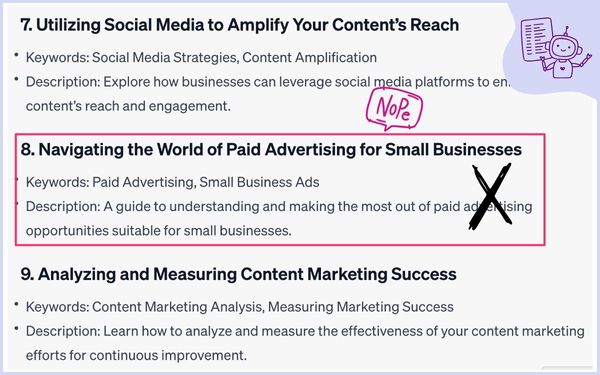
When I compare the topic “paid advertising for small business” to my list of business requirements, it’s easy for me to remove it as a topic and keyword since it doesn’t meet any of the criteria!
Below is a list of some example criteria that you could use to assess whether a topic is going to support your business. Use this list or come up with your own criteria. Then assess each topic against your list. Get rid of any topics that don’t meet at least two of the criteria.
Using a list like this makes it faster and easier to determine which topics support your business…and which don’t.
Business Requirements Checklist for Blog Post Topics (Example)
- Is the topic of interest to a potential buyer versus anyone in my target market?*
- Does it align with my business offers and goals?*
- Will the topic support the buyer’s journey or a marketing campaign?
- Does it position me/the business as an authority?
- Is the topic part of a collaboration or affiliate opportunity?
NOTE: Don’t expect a topic to achieve every one of these characteristics! I recommend that each topic meets at least TWO of the criteria.
Hopefully, this list inspires you to create a checklist based on your own business and goals.
Every post you publish should have a blogging goal and purpose. Intention and strategy transform a blog into a successful marketing and lead generation tool. Thus, the outcome of this step is to ditch any topics that don’t have a clear purpose in your blogging strategy.
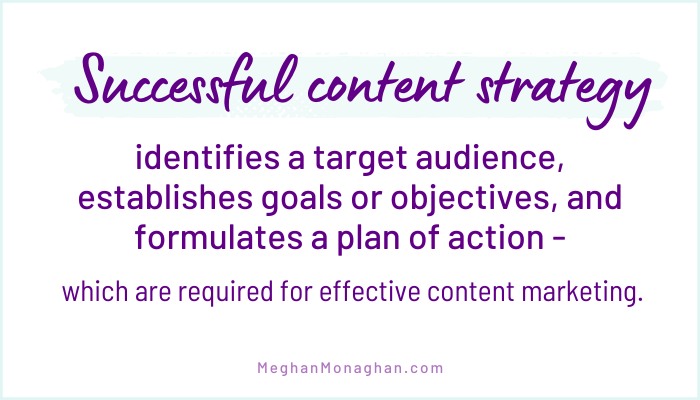
Pay Attention to Topic Relevance When You Choose Blog Post Topics
Let me explain why the business assessment checklist is critical.
Finding topics that appeal to a broad segment of your audience is not difficult. But, your job isn’t to attract everyone. Your job is to entice more interested, warmer leads who could be potential customers, which requires more strategic thought.

Also, you must come up with topics that tie into your products or services. Otherwise, you’ll waste time on content that isn’t profitable and on topics that you can’t monetize. Because when a content topic doesn’t fit into your potential customer’s journey or relate to your business, it’s more challenging to get leads and sales.
Why the emphasis? Well, in the past, I made the mistake of selecting some of the wrong blog post topics. I didn’t have a content strategy, and I didn’t understand my business all that well. This led to choosing topics that were irrelevant, which still haunts my SEO to this day! 🤦🏻♀️

This seems like no big deal, right? But, in reality, the outcome is that it harms your business.
Irrelevant topics translate to people who don’t buy. But, if that isn’t bad enough, the wrong blog post topics attract visitors who arrive at your site and leave quickly. This is “dead ending,” which doesn’t send good signals to Google and can negatively affect your SEO juice.
Furthermore, irrelevant topics mess with your metrics and with how search engines categorize your content. Think about it: how can Google or your audience tell what you’re an authority in when you’re sending mixed signals with rogue topics?
In the end, it’s preferable to be strategic about choosing topics for your business blog.
Step 3: Analyze the Topics for Performance and Modify if Needed
Think of this process like a competition. Step 2 was the first round of cuts based on your business needs. Now it’s time to eliminate the low performers in an effort to identify the best of the best!
In Step 3, you’ll analyze how each topic performs using an SEO / content marketing tool then decide whether to keep, modify, or ditch it.
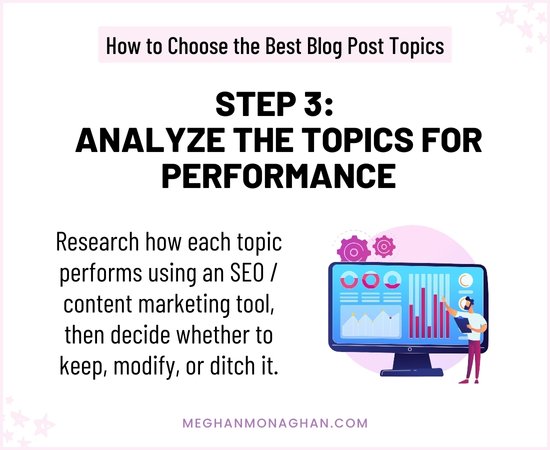
This kind of upfront content research helps you assess whether a topic is set up for success before you even write a single word.
However, in-depth research can be time-consuming and laborious. So, I recommend using a tool or a combination of tools to perform content research.
Tools save you time. Plus, they provide data points to help you analyze or estimate the performance of certain content topics.
In general, tools give you the support and strategy you need to guide your content’s direction so that your blog serves your business better.
If you have the budget, you may want to use a tool that does the heavy lifting for you and more, such as:
- Semrush
- MarketMuse
- SurferSEO
- Frase
Although they are more expensive, these tools remove a lot of the manual work. Plus, they offer additional content help including topic clustering and AI options that include help with SEO blog writing.
And, since you’re not a marketing expert, these tools can act like your own strategist. Therefore, the investment may be worth it. But, many content tools often have a steep learning curve, so be prepared.
It’s okay to opt for a free, less complex tool like Ubersuggest to research some basic information. It’s up to you which option to select.

The Content and SEO Performance Metrics to Guide Your Choices
Though I can’t pass on years of experience in a few sentences, I will give you a few data points to use when analyzing whether a blog post topic is one to keep.
Here are some indicators of success to research:
- Monthly search volume
- Keyword/term competition (SEO difficulty)
- Ranking
- Search intent
- Competitors
- Topical authority
- Domain authority
- Word length
- Topic depth/coverage
- Date of post
- Social shares (optional)
For example, are enough people searching for the topic (aka search volume)? If not, you may want to skip it.
Or, is the term so competitive (aka high SEO difficulty) that it may not be worth the effort? Ideally, you’re looking for topics that have a good monthly search volume and low to medium difficulty.

Anyway, your job is to analyze each blog post topic or keyword’s performance and characteristics to decide whether to:
- keep as is
- modify to something that performs better but still meets your business requirements criteria,
- eliminate from your list or
- postpone for future consideration.
Go through your list of topics and analyze each one using the tool of your choice, and then you’re on to the next task!
Exceptions
Sometimes you may want to tackle topics that aren’t popular with a big group of people but are of interest to YOUR specific person.
For instance, I wrote a blog post about “what to do before hiring a content marketing consultant.” This isn’t a popular term or topic. However, it’s a question that prospects ask me. Plus, the topic supports my business in numerous ways, from consultations to email campaigns.
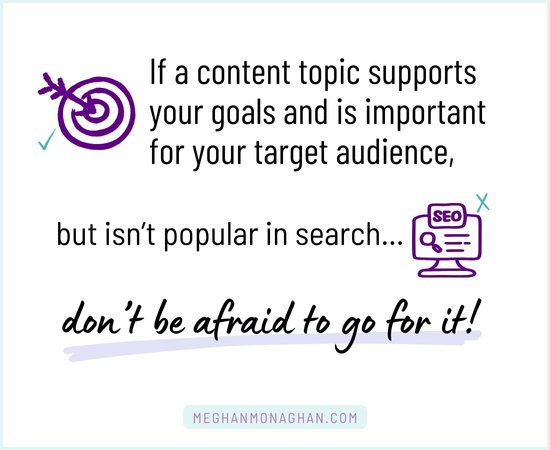
SEO isn’t necessarily always your priority. Some posts may support an email marketing campaign or tie into the customer journey, and these topics may not be popular in SERPs. And that’s okay!
At times, you may need to choose blog post topics that support your business needs and goals but don’t perform well in search.
After You Choose Blog Post Topics for Your Business, Create a Content Calendar
As much as you may prefer creating content on a whim, your business is better served with some planning.
In the long run, content planning and strategy lend themselves to more successful blogging efforts. What could successful blogging look like?
- Better, higher results in search
- More targeted website visitors and relevant leads in your sales funnel
- More people buying your products and services
You don’t have to overdo it with your planning. But, once you’ve got your list of blog topics, it’s time to put them into action by creating a content calendar.
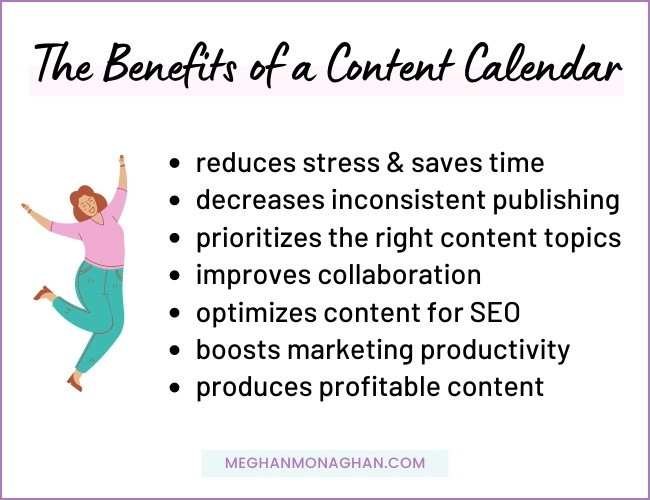
A calendar is an effective way to boost your marketing productivity, reduce stress, and achieve your business goals. Learn more about it in my post on how to create your own simple content calendar.
All of this upfront research and planning ahead maximizes your results and keeps you from wasting time on content marketing.
As you can tell from this post, there’s a lot of preparation that goes into blogging and choosing topics. If you don’t have the time or expertise, I’d be happy to help! Check out my blog content strategy and calendar service.
Please leave me a comment below and share any insight you have or something you learned from this post – I love hearing from you!
UPDATED OCTOBER 25, 2023 | ORIGINALLY PUBLISHED MARCH 21, 2018


SEO has always been sort of a mystery for me. You’ve made it clearer and more doable with these steps. I love talking about stepmom issues and there are a lot of them.
My battle is “negative” connotation attached to the word stepmom. It’s an ongoing battle but one that I believe we are slowly winner.
I will definitely take the time to search into more effective SEO and blog posts…
Thank you for stopping by to read my post and for leaving a thoughtful comment. SEO can be very complicated! I’m happy to hear these tips helped a bit.
Meghan, I’ve used google searches as an SEO tool for my blogs. Over the years, I’ve written about a lot of different things but have a few themes including success tips, family caregiving and leadership. Now, I’m all about the caregiving and NOT blogging on leadership anymore. You are one of the most detailed blogger I know and I SO appreciate all the effort you put into this article and giving us the details about where to go for what. I have a google analytics but admit I don’t know how to use it (someone set it up for me years ago). I’ll set time aside this week to go through all this goodness!
Great to hear that you actually do research for your blog posts, Tandy! YAY! Google Analytics isn’t all that intuitive, so I can see why you haven’t incorporated it into your blogging process. However, reviewing your past posts is really helpful. You can see what you’re ranking for and what content you need to focus on moving forward. You have a message to share with the world, so let’s make sure people see it!
SEO has always been sort of a mystery for me. You’ve made it clearer and more doable with these steps. I love talking about stepmom issues and there are a lot of them.
My battle is “negative” connotation attached to the word stepmom. It’s an ongoing battle but one that I believe we are slowly winner.
I will definitely take the time to search into more effective SEO and blog posts.
I think search engines want SEO to be a bit of a mystery, Claudette. 😉 I’m happy to hear that I shed some light on the topic. Even just a few tweaks to your title and headings can help!
Meghan you are such an incredible blogger. For those of us who are not as techy as you, you provide such great instruction. I read through this and it is absolutely a weekend project for me to go back through and use all your helpful tools. Sharing with my friends! Thank you!
Why thank you for the lovely compliment Candess! Very kind of you. 🙂 You can always start small and incorporate updating posts into your weekly schedule. I can’t imagine tackling this over a weekend, but good for you if you do! About once a month, I go back to one blog post to update it or clean up some of my categories and tags. I knew a lot less about SEO and blogging when I first started this blog!
Being in the lifestyle space, this is something I really worry about. I’ve even considered breaking my blog into separate, niche specific blogs, but it just feels so time consuming to do that. But I think that’s the direction I’m heading. I’ve cut out quite a few topics over the past few months
As they always say, the more you niche, the better! I do think having a lifestyle blog may present dilemmas when it comes to paring down to just a few main categories. I can’t even imagine splitting my blog up! That would be a lot of extra work. Like you mention, cutting out some topics and then maybe focusing more heavily on certain categories may help.
I like keeping it simple with Keywords, Topic. Title and answering the questions, why am I writing this? Good suggestions…
There’s nothing wrong with simple, Sharona!
I must have Google totally confused. I write about everything. I have narrowed my focus slightly down to environment, creativity and grandparenting. It may be time for me to have a strategy and use some of these very helpful and informative tips, Meghan. Thank you.
LOL! I’ve confused Google plenty, so you are not alone! Not being clear about your most important blog topics may not be a problem…it always depends on your goals. If you’re writing for fun and increasing your visibility in search isn’t important, then blogging about everything isn’t necessarily an issue. 😉